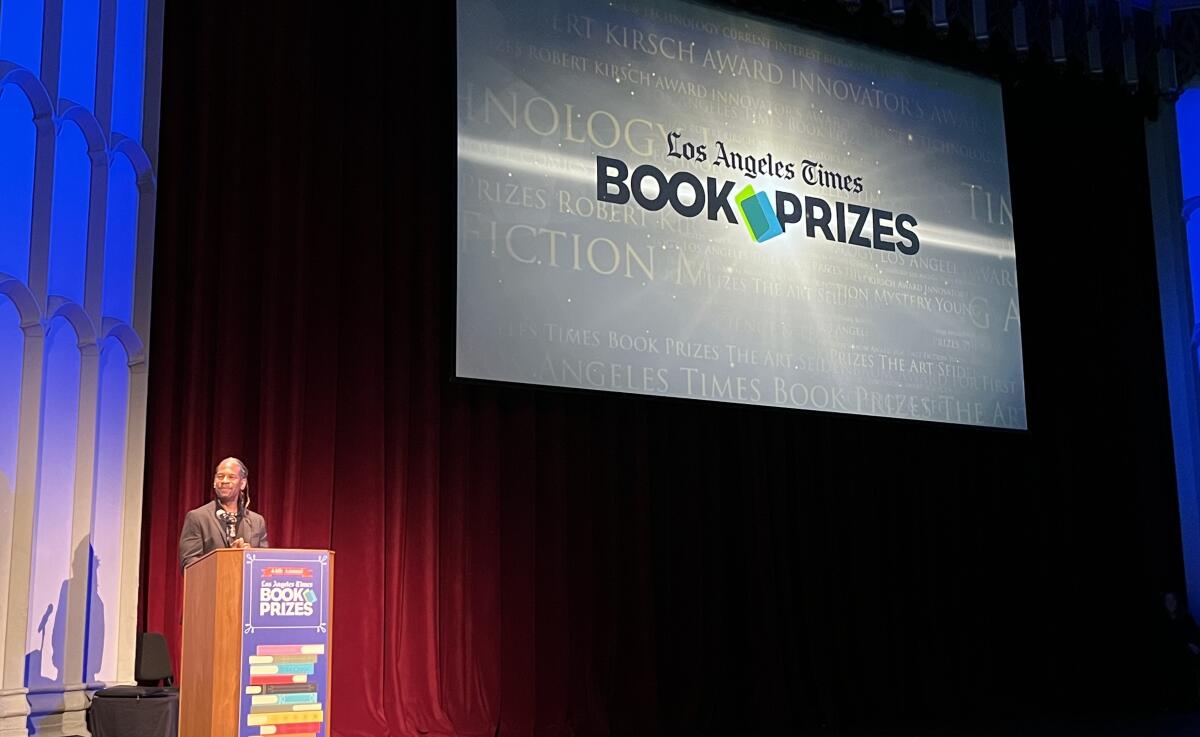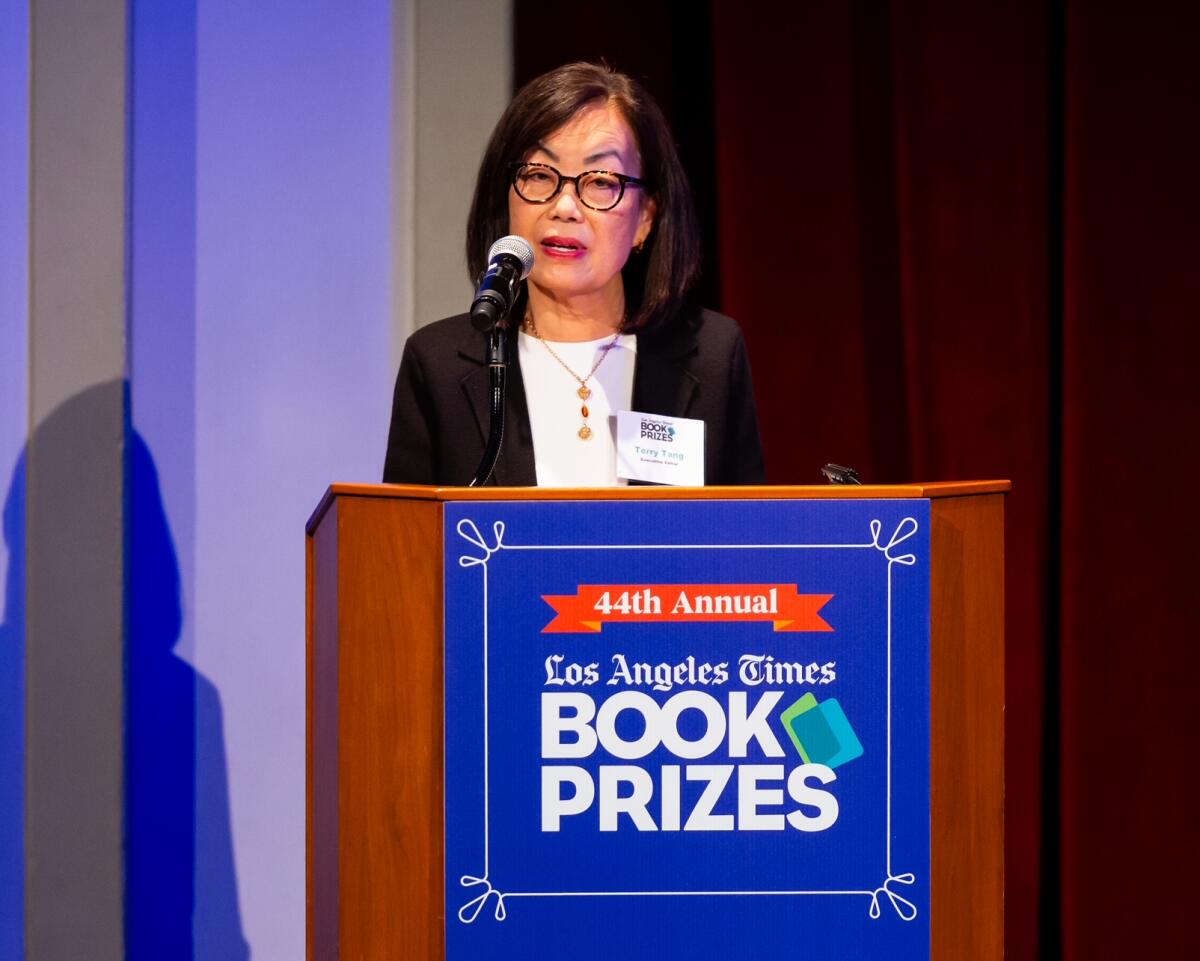The spotlight shined on great literature Friday night at the 44th Los Angeles Times Book Prizes ceremony at USC’s Bovard Auditorium, where winners took the stage to celebrate their honors and, in some cases, call attention to the free speech controversy unfolding on campus.
A political undercurrent ran through the night’s speeches following the university’s cancellation of a commencement speech by pro-Palestinian valedictorian Asna Tabassum. Emily Carroll, who won the Book Prizes’ graphic novel/comic category, ended their speech by calling on USC to restore Tabassum’s appearance, “so that she may inspire her community of peers with, as she’s put it, her ‘message of hope.’ Also, I would like to express my own solidarity with Asna and also my solidarity with Palestine.”
Applause drowned out Carroll’s words at times. Later, Tananarive Due, who won for science fiction, fantasy and speculative fiction for her novel “The Reformatory,” used her speech to add: “As we face the horrors in our cities, in Gaza and elsewhere, and witness true-life racism, homophobia, Islamophobia and antisemitism, let us honor the courage of young people.” They, Due said, have been the drivers of change throughout history.
Tananarive Due, winner of the Los Angeles Times Book Prize for science fiction, fantasy and speculative fiction for her novel “The Reformatory,” used her speech Friday night at USC to praise young people with the courage to speak out on social and political issues.
Upon accepting the award for the current interest category, Roxanna Asgarian added her support for Tabassum. “She earned her right to speak,” Asgarian said. “Let her speak.” Amber McBride, who won for young adult literature concluded her speech by saying, “Free Palestine.”
The focus for the rest of the evening were the books themselves — 60 finalists in 12 competitive categories plus three special honors. Jane Smiley accepted the Robert Kirsch Award for lifetime achievement, which pays tribute to a writer with a substantial connection to the American West. The L.A.-born author, who won the Pulitzer Prize for fiction in 1992 for her novel “A Thousand Acres,” gave a brief, heartfelt speech, noting, “I love to write novels, I love to go for walks and look around. And I think the greatest pleasure of the novelist’s life is curiosity.”
Claire Dederer received the Christopher Isherwood Prize for Autobiographical Prose for “Monsters: A Fan’s Dilemma.”
“‘Monsters,’ a book-length expansion of an essay on the problematic relationship between masculinity and fame, considers how we come to love art made by less than perfect humans,” read the selection committee’s praise. “Dederer engages the essayist form at its best and the result is both critical, literary and provocative.”
“These are really, really dark days,” said Dederer, accepting the award. “And I’m so grateful for this bright moment.”
The final special honor went to Access Books, which received the Innovator’s Award for its work renovating school libraries to enhance access to books and literary resources for underserved students and communities.
This year’s Book Prizes featured a new category: achievement in audiobook production. That award, which honors performance, production and innovation in storytelling — given in collaboration with Audible — went to Dion Graham and Elishia Merricks for “Thank You (Falettinme Be Mice Elf Agin): A Memoir.” The judges noted Graham’s “transcendent” narration of musician Sly Stone’s “percussive and almost musical writing” in his memoir.

LZ Granderson emcees the Los Angeles Times Book Prizes, held Friday night at USC’s Bovard Auditorium. The event kicks off the Festival of Books running Saturday and Sunday.
(Craig Nakano)
Ed Park’s novel “Same Bed Different Dreams” took the fiction prize. The selection committee singled it out for being “as playful as it is moving, as serious as it is otherworldly and as funny as it is intellectually stimulating.”
The Art Seidenbaum Award for First Fiction went to Shannon Sanders’ debut, “Company: Stories,” which features 13 stories that follow the lives of a multi-generational Black family from the 1960s to the 2000s in cities including Atlantic City, N.J., New York and Washington, D.C. “The prose is magnificent, mature and breathtakingly precise, and the collection resounds with a sensitivity and wisdom rarely seen in a debut,” noted the judges.
Gregg Hecimovich won for biography with “The Life and Times of Hannah Crafts: The True Story of The Bondwoman’s Narrative,” about a slave who escaped from a Southern plantation and spent the rest of her life evading capture. The book was chosen out of more than 100 entries, with the selection committee writing, “Through Hecimovich’s painstaking historical detective work and keen literary analysis, the reader is rewarded with a captivating and vivid portrait of a life once stolen by enslavers and long robbed of recognition. This is at once a startling and original work.”

L.A. Times Executive Editor Terry Tang opened the Book Prizes ceremony by noting the Festival of Books remains the largest event of its kind in the nation.
(Varon Panganiban / For the Los Angeles Times Festival of Books)
Carroll won for “A Guest in the House,” an adult horror story about a woman who marries a dentist and discovers there is a mystery to be solved when it comes to the death of his former wife. “A fleshy, sensuous journey that pushes the limits of the medium in ways that only Carroll can. A skin-crawling gem, not to be missed,” wrote the selection committee.
Joya Chatterji took home the prize for history with “Shadows at Noon: The South Asian Twentieth Century,” which limns the region’s trajectory from British colony to three complex, independent nations.
The mystery/thriller award went to Ivy Pochoda for “Sing Her Down.” The unique nail-biter takes place in the shadows of L.A.’s homeless camps, run-down motels and dark alleys, following women who have turned — for various reasons — to a life of crime. The judges, including Alex Segura, Wanda Morris and mystery fiction critic Oline Cogdill, wrote, “Pochoda brilliantly explores her characters and this setting, while sifting through myriad literary tropes, including allusions to Macbeth, mythology, even a bit of a Greek chorus.”
Airea D. Matthews’ “Bread and Circus” was honored in the poetry category. Matthews is an associate professor of creative writing and the co-director of the creative writing program at Bryn Mawr College. She was named the 2022-23 poet laureate of Philadelphia.
The prize for science fiction, fantasy and speculative fictior went to Due for “The Reformatory.” The novel is part horror, part historical fiction in its examination of life under Jim Crow law in the South.
Eugenia Cheng’s “Is Math Real? How Simple Questions Lead Us to Mathematics’ Deepest Truths” nabbed the prize for science & technology, with the judges writing, “Beginning with a dedication to readers who think math isn’t for them, Cheng shows us that not only is math for all of us, but so is the act of searching for meaning in shapes, patterns and symbols that simultaneously seem like they have nothing to do with us and also everything to do with who we are as a species.”
Cheng uttered perhaps the most helpful line to all the writers in the room Friday night, noting to applause, “If you have ever been made to feel bad at math, you didn’t fail math, math failed you.”
The story of a 12-year-old blue-skinned girl called Inmate Eleven who is being groomed to be a partner to a white-skinned teen clone, and future president of Bible Boot, is the plot of McBride’s “Gone Wolf,” which won for young adult literature. “McBride mixes American history with speculative fiction to dissect melancholia and political anxiety for young people who are living through uncertain times — in the future and today,” wrote the judges.
The ceremony, which opened with remarks by Times Executive Editor Terry Tang and was emceed by Times columnist LZ Granderson, serves as a kickoff to the Festival of Books running Saturday and Sunday across USC. The full list of finalists and winners is below.
Achievement in Audiobook Production
Maria Bamford and Mike Noble, “Sure, I’ll Join Your Cult: A Memoir of Mental Illness and the Quest to Belong Anywhere”
Sophia Bush, Helena De Groot and Kerri Kolen, “Wild and Precious: A Celebration of Mary Oliver”
Dion Graham, narrator, and Elishia Merricks, producer, “Thank You (Falettinme Be Mice Elf Agin): A Memoir”
Helen Laser and Suzanne Franco Mitchell, “Yellowface”
Adam Lazarre-White and Elishia Merricks, “All the Sinners Bleed”
The Art Seidenbaum Award for First Fiction
Stephen Buoro, “The Five Sorrowful Mysteries of Andy Africa: A Novel”
Sheena Patel, “I’m a Fan: A Novel”
Shannon Sanders, “Company: Stories”
James Frankie Thomas, “Idlewild: A Novel”
Ghassan Zeineddine, “Dearborn”
Biography
Leah Redmond Chang, “Young Queens: Three Renaissance Women and the Price of Power”
Gregg Hecimovich, “The Life and Times of Hannah Crafts: The True Story of The Bondwoman’s Narrative”
Jonny Steinberg, “Winnie and Nelson: Portrait of a Marriage”
Elizabeth R. Varon, “Longstreet: The Confederate General Who Defied the South”
David Waldstreicher, “The Odyssey of Phillis Wheatley: A Poet’s Journeys Through American Slavery and Independence”
The Christopher Isherwood Prize for Autobiographical Prose
Claire Dederer, “Monsters: A Fan’s Dilemma”
Current Interest
Bettina L. Love, “Punished for Dreaming: How School Reform Harms Black Children and How We Heal”
Roxanna Asgarian, “We Were Once A Family: A Story of Love, Death, and Child Removal in America”
Zusha Elinson, “American Gun: The True Story of the AR-15”
Cameron McWhirter, “American Gun: The True Story of the AR-15”
Christina Sharpe, “Ordinary Notes”
Raja Shehadeh, “We Could Have Been Friends, My Father and I: A Palestinian Memoir”
Fiction
Susie Boyt, “Loved and Missed”
Yiyun Li, “Wednesday’s Child: Stories”
Elizabeth McKenzie, “The Dog of the North: A Novel”
Ed Park, “Same Bed Different Dreams: A Novel”
Justin Torres, “Blackouts: A Novel”
Graphic Novel/Comics
Derek M. Ballard, “Cartoonshow”
Matías Bergara, “CODA”
Emily Carroll, “A Guest in the House”
Sammy Harkham, “Blood of the Virgin”
Chantal Montellier, “Social Fiction”
Simon Spurrier, “CODA”
History
Ned Blackhawk, “The Rediscovery of America: Native Peoples and the Unmaking of U.S. History”
Joya Chatterji, “Shadows at Noon: The South Asian Twentieth Century”
Malcolm Harris, “Palo Alto: A History of California, Capitalism, and the World”
Blair L.M. Kelley, “Black Folk: The Roots of the Black Working Class”
Nikki M. Taylor, “Brooding Over Bloody Revenge: Enslaved Women’s Lethal Resistance”
Innovator’s Award
Access Books
Mystery/Thriller
Lou Berney, “Dark Ride: A Thriller”
S. A. Cosby, “All the Sinners Bleed: A Novel”
Jordan Harper, “Everybody Knows: A Novel”
Cheryl A. Head, “Time’s Undoing: A Novel”
Ivy Pochoda, “Sing Her Down: A Novel”
Poetry
K. Iver, “Short Film Starring My Beloved’s Red Bronco”
Airea D. Matthews, “Bread and Circus: Poems”
Maggie Millner, “Couplets: A Love Story”
Jenny Molberg, “The Court of No Record: Poems”
Simon Shieh, “Master: Poems”
Robert Kirsch Award
Jane Smiley
Science & Technology
Eugenia Cheng, “Is Math Real? How Simple Questions Lead Us to Mathematics’ Deepest Truths”
Jeff Goodell, “The Heat Will Kill You First: Life and Death on a Scorched Planet”
Jaime Green, “The Possibility of Life: Science, Imagination, and Our Quest for Kinship in the Cosmos”
Caspar Henderson, “A Book of Noises: Notes on the Auraculous”
Zach Weinersmith, “A City on Mars: Can We Settle Space, Should We Settle Space, and Have We Really Thought This Through?”
Kelly Weinersmith, “A City on Mars: Can We Settle Space, Should We Settle Space, and Have We Really Thought This Through?”
Science Fiction, Fantasy & Speculative Fiction
Tananarive Due, “The Reformatory: A Novel”
Daniel Kraus, “Whalefall”
Victor LaValle, “Lone Women: A Novel”
V. E. Schwab, “The Fragile Threads of Power”
E. Lily Yu, “Jewel Box: Stories”
Young Adult Literature
Jennifer Baker, “Forgive Me Not”
Olivia A. Cole, “Dear Medusa”
Kim Johnson, “Invisible Son”
Amber McBride, “Gone Wolf”
Sarah Myer, “Monstrous: A Transracial Adoption Story”


